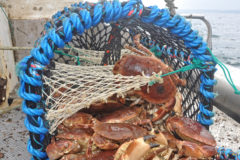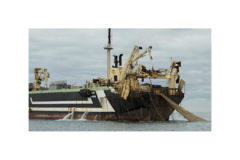Creel men make legal move on Skye fisheries pilot
Application for judicial review of ‘creel only’ trial rejection
A Scottish fishermen’s association representing creel fishermen has mounted a legal challenge to Marine Scotland over its rejection of a proposal for a ‘creel only’ pilot fishery in the Western Isles, reports Tim Oliver.
The Scottish Creel Fishermen’s Federation (SCFF) and Fish Legal have lodged a petition for a judicial review of the decision by the Scottish government to refuse the application by the North West Responsible Fishermen’s Association (NWRFA) for a fisheries pilot in the Inner Sound of Skye.
The NWRFA pilot proposal was submitted under the Scottish government’s Inshore Fisheries Pilots programme, which was designed to trial different aspects of gear restriction (separating mobile and static fishing gear) in order to improve the evidence informing inshore fisheries management.
The SCFF said its grounds for the judicial review are that Marine Scotland refused the Inner Sound pilot based on the results of a public consultation, rather than applying the criteria that their own pilot programme guidance had set out as the basis on which applications would be determined.
“Consultation responses were dominated by members of the trawl industry, who will object, as a matter of course, to any restriction on their freedom to trawl,” says the SCFF.
It also says it has a wider concern that this case ‘follows a pattern that suggests that the mobile sector wields too much influence with Marine Scotland, and thus that the management of our fisheries appears more aligned with the interests of the mobile sector than with the public interest or fisheries policy under the National Marine Plan’.
The NWRFA pilot was specifically designed to examine what environmental and economic benefits might be obtained in a ‘creel only’ zone as opposed to a ‘trawl only’ zone in the Nephrops fishery.
In a briefing note giving the background to its judicial review challenge, the SCFF says that the Nephrops creel fishery is a low-impact high-value fishery that supplies the valuable live langoustine market, while the Nephrops trawl fishery is a high-impact low-value fishery that supplies the scampi market. “There is a growing concern that Nephrops trawling has caused the chronic decline in west coast fish populations because of its very high levels of by-catch,” says the SCFF.
Alistair Sinclair, the national co-ordinator of the SCFF, said that after ‘years of frustration’ in dealing with Marine Scotland and the Scottish government, the SCFF had no option other than to challenge Scottish government policy and decision-makers at the highest court in the land.
He said that SCFF believes that the Scottish court system will recognise the community and economic benefits of restricting mobile activities within the Skye Inner Sound.
“Whilst the Scottish government appears to be coping better than some with the current Covid situation, alas our marine environment continues to be failed by civil servants who keep rolling out policies that say a lot in printed form – however, in reality, they have failed the Scottish people,” he said.
The SCFF says that its legal challenge highlights ‘an apparent gap between policy and practice’ in the way Marine Scotland manages Scotland’s publicly owned inshore fisheries.
It says: “We have an uncontroversial definition of fisheries management: ‘the application by a public authority of fisheries management measures in support of inshore fisheries policy objectives and the public interest’.
“The broader question needing urgent examination is whether Marine Scotland, in managing our inshore fisheries, meets this definition both in the case of the Inner Sound pilot programme and more generally.
“The failures on behalf of Marine Scotland that led the SCFF to bring this judicial review follow a predictable pattern of behaviour, which suggests that it may not. We believe this to be a matter of great public concern because our fisheries are one of Scotland’s greatest assets. Our inshore fisheries are of particular ecological value, as well as being of huge economic significance to coastal communities.
“This judicial review is ultimately about the Scottish government doing what it says it is going to do. In this case, the crucial issue is understanding the relationship between protection of key marine ecology and maintaining a healthy fishing economy.”
The federation quotes Scottish first minister Nicola Sturgeon as saying in 2018 that ‘countries now understand that protecting the environment is not something that is done at the expense of jobs and the economy, but is essential to securing jobs and the economy for the future’.
It says that the Scottish government understands the importance of the relationship between protecting the environment and protecting jobs and the economy.
“The issue of obtaining evidence of that relationship, for fisheries management purposes, is at the heart of this judicial review”, and it is also also about trust and confidence in the Scottish government’s policies, says the SCFF.
SFF: ‘Mixed fleet best’
Commenting on the application for a judicial review, Elspeth Macdonald, chief executive of the Scottish Fishermen’s Federation, insisted that continuation of the existing blend of mobile and fixed gear in the area was the right solution.
She said: “The Inner Sound is closed to trawlers for six months of the year, but crucially provides a sheltered area for them to work in during the spring.
“A report carried out by Anderson Consulting in 2017 into the Nephrops industry highlighted a lack of evidence that creeling was more economically beneficial than trawling.
“It also indicated that a diverse fleet was well suited to the geography of Scotland and to the peripheral areas in which it operates.”
The Scottish government declined to comment on the judicial review petition. A spokesperson said: “We can confirm that judicial review proceedings have been raised. Since these proceedings are ongoing, it would not be appropriate to comment further.”






